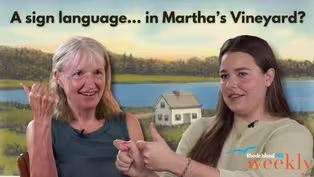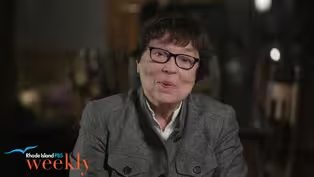
Living Longer
Clip: Season 4 Episode 42 | 10m 26sVideo has Closed Captions
Rhode Island-based author William Kole explores how people make it to 100 years of age.
How long can we live? And how long should we live? Those are some of the questions author William Kole poses in his new book, “The Big 100.” By 2050, demographers estimate we’ll have eight times more centenarians around the world than we do now. Rhode Island PBS Weekly talks with Kole about the challenges a super-aging society will bring and how to increase our odds of living a long life.
Problems playing video? | Closed Captioning Feedback
Problems playing video? | Closed Captioning Feedback
Rhode Island PBS Weekly is a local public television program presented by Ocean State Media

Living Longer
Clip: Season 4 Episode 42 | 10m 26sVideo has Closed Captions
How long can we live? And how long should we live? Those are some of the questions author William Kole poses in his new book, “The Big 100.” By 2050, demographers estimate we’ll have eight times more centenarians around the world than we do now. Rhode Island PBS Weekly talks with Kole about the challenges a super-aging society will bring and how to increase our odds of living a long life.
Problems playing video? | Closed Captioning Feedback
How to Watch Rhode Island PBS Weekly
Rhode Island PBS Weekly is available to stream on pbs.org and the free PBS App, available on iPhone, Apple TV, Android TV, Android smartphones, Amazon Fire TV, Amazon Fire Tablet, Roku, Samsung Smart TV, and Vizio.
Providing Support for PBS.org
Learn Moreabout PBS online sponsorshipand society is just not quite ready to accommodate us in large numbers.
- [Michelle] Journalist William Kole has long been fascinated by centenarians.
His grandmother, a former toe dancer and pianist for silent movies, was one of them.
- My grandmother was born in 1899 and died in 2003, just shy of her 104th birthday.
And when you have somebody like that in your family, it just leaves an indelible impression on you.
- [Michelle] Kole has been writing about extreme aging since the 1990s.
While based in Paris, he reported on Jeanne Calment, a French woman who lived to 122.
The world's oldest person on record garnered worldwide media attention.
- [Reporter] She lives at a retirement at Aries in southern France.
- She was a very amusing individual.
My favorite quote was, "I only have one wrinkle and I'm sitting on it."
- [Michelle] He also covered Dr. Jack Kevorkian, a controversial pathologist who helped end the lives of more than 100 terminally ill people.
- In a journalism career, there's a lot of death and dismemberment and tragedy.
I think that just helps you to treasure life and family.
And then when you see people living to these incredible ages, you have a real appreciation for everything they've had to overcome to get there.
- [Michelle] Kole's fascination with aging and life motivated him to write, "The Big 100: The New World of Super-Aging."
You talk in the book about how we are on the verge of this longevity revolution.
Why are we expected to see so many people reach 100 and beyond?
- The baby boom generation is a big deal, numerically.
There are more than 70 million of us.
I say us because I'm a boomer myself.
So in the next 25 years, they're going to be aging into triple digits and that will drive the numbers of people living to 100 significantly.
- [Michelle] On top of that, advancements in medicine have also contributed to an influx of centenarians, some of whom are still working, including 101 year old producer, Norman Lear.
He created sitcoms like "All in the Family."
- Now on three, okay?
One, two, three.
(audience laughs) (rocket whooshes) - [Michelle] And many inching their way toward 100 aren't slowing down.
Actor William Shatner was 90 when he became the oldest person to blast off into space in 2021.
- Oh, Jesus.
- [Michelle] The odds of a centenarian making it to space are growing.
Researchers at Stanford University say 50% of five year olds in the United States can expect to reach a triple digit lifespan.
- Some of us may live to 100 and not want to.
We have the genes and the healthy lifestyle that's gonna take us there.
The problem is, are we ready as a society for a 100 year life?
- [Michelle] The short answer, Kole says, is no.
For starters, Social Security's trust fund reserves are expected to run out of money in a decade.
He's conscious of what it costs to live a long life.
He recently retired as New England editor for the Associated Press, but decided to take on part-time work as a copy editor.
- I enjoy the work keeping my hand in journalism but I'd be lying if I said that a primary motivation wasn't to make bank.
We don't wanna outlive our money.
- [Michelle] If elderly people outlive their savings, Kole cautions that younger generations who've relied on inheritances to buy a home, may be left empty handed.
- I'm just gonna chop these so we have 'em.
I'll put 'em in a bag.
- [Michelle] Kole and his wife, Terry, think a great deal about what they need to do to increase their chances of living longer.
They want to be around for their two children and their two grandchildren.
Kole's also encouraged by his 92 year old mom who lives alone in the house where he grew up.
It turns out, humans have more control in increasing their lifespans than they might think.
- Our genes are a huge factor in what gets us to 100.
But it's very interesting that from birth to 90, our behaviors account for about 75% of success in living that long.
And the genetic piece is about 25%.
Once we reach 90 and go beyond, it all flips, and our genes are about 75% determining whether we get to 100 or beyond on.
- [Michelle] Kole's hopeful that his love of running helps him reach 100.
He's enjoyed running since he was a kid.
These days, he puts in about 25 miles a week around his neighborhood in Warwick's Pawtuxet Village.
It's a way for him to blow off stress and stay physically fit.
Several studies have shown that vigorous movement can also significantly reduce the risk of developing dementia.
- My wife and I recently have been moving more towards a pescatarian diet, so that's healthier for us.
And I stopped working full-time in the news industry because I wanted to control my stress.
- So what are you telling me that I should do?
- You're in the wrong business.
(Michelle laughs) - [Michelle] It's impossible to live a life without stress, but what sets super agers apart from everyone else, according to Kole, is their ability to find the best in a situation and make a plan to move forward.
- If you can maintain a positive attitude, there are studies that suggest that you can live seven and a half years longer, which is actually more than what you gain by watching your cholesterol and your weight.
- [Michelle] But while Kole's doing his part to live a long and healthy life, he says too many people have the odds stacked against them.
- White Americans, on average, live almost six years more than Black Americans.
Consequently, they die earlier of preventable causes.
They have higher incidences of diabetes and heart disease.
These are all things that are fixable and it feels to me like we need to make this a huge priority.
- [Michelle] Kole says the United States also needs to prioritize how it caress for the elderly.
The number of caregivers who work with seniors is projected to drop significantly in the coming decades.
- We live in a very youth obsessed, ageist society, frankly.
We value young people over elders in many respects.
And as our society shifts to be one of more older adults, what's that gonna look like?
- [Michelle] Kole says society should take a page from the Blue Zones, five communities around the world where people tend to live the longest.
- People tend to not stuff themselves and then push themselves away from the table full.
They eat until they're 80% full and then they stop.
Another thing is good sleep hygiene.
They get at least eight hours a minimum of good sleep.
In many places, especially in Western culture, we are going all the time.
That's not a recipe for 100 year life.
Hello.
You're so pretty.
Did you just get a shampoo?
- [Michelle] Social isolation isn't part of the recipe either.
- Okay, here you go.
Want it?
That's your ball.
- [Michelle] Kole's in good company but he acknowledges many people are growing old alone.
- The US Surgeon General recently declared loneliness to be a public health crisis.
Really being lonely is like smoking 15 cigarettes a day.
That's how harmful it is to our bodies.
- What scares you most about the prospect of getting to 100 and older?
- I think loneliness, outliving a child, is just not something anybody wants to do.
And I think, honestly, climate change, it throws a big question mark over all of this.
- [Michelle] If conditions are favorable and if Kole's in good health, it's no surprise, he says, he would like to reach the big 100.
- I do like the idea of living to 100.
I think there's a lot of bleakness, but also brightness about a long life.
Time spent creating and contributing more to society, extra years spent in the company of those we love the most.
It's beautiful, potentially.
- And here's another interesting thing I learned
Video has Closed Captions
Clip: S4 Ep42 | 9m 22s | The hidden history of Martha’s Vineyard Sign Language. (9m 22s)
Video has Closed Captions
Clip: S4 Ep42 | 4m 40s | Arlene Violet is worried about the fracturing of America. (4m 40s)
Providing Support for PBS.org
Learn Moreabout PBS online sponsorship
- News and Public Affairs

Top journalists deliver compelling original analysis of the hour's headlines.

- News and Public Affairs

FRONTLINE is investigative journalism that questions, explains and changes our world.












Support for PBS provided by:
Rhode Island PBS Weekly is a local public television program presented by Ocean State Media

